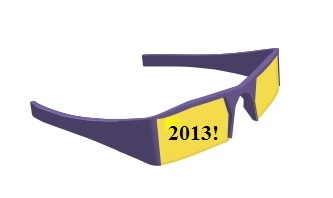 Project Glass not likely to offer augmented reality at launch
Project Glass not likely to offer augmented reality at launch
Google’s Project Glass has been receiving limited attention in recent months, largely due to the fact that Google has pumped the brakes on its promotional campaigns concerning the augmented reality glasses. Project Glass remains in a state of early development, but several prototype models have been seen in the real world, outside of Google’s laboratory. There have been rumors circulating that Project Glass will not actually include augmented reality technology, a feature that drew in the majority of attention concerning the high-tech eyewear. These rumors may actually be true.
Head engineer notes that augmented reality is not an immediate goal
Project Glass head engineer Babak Parviz has announced that augmented reality is not an immediate goal for the project. This may come as a shock for consumers that have been looking forward to the high-tech eyewear because Google has been very adamant about the inclusion of augmented reality technology in Project Glass. When the glasses were first unveiled in early 2012, augmented reality was billed as one of the project’s primary features.
Google faces criticism for hyping augmented reality
For several months after the unveiling of Project Glass, Google has been pushing the idea that augmented reality would be one of the cornerstone features of the glasses. According to Parviz, however, augmented reality has been difficult to incorporate into the project. As such, augmented reality may be completely absent from the commercial launch of Project Glass. Instead, the eyewear will come with an application programming interface that will allow developers to create their own applications.
Developers able to create their own applications for Project Glass
The application programming interface will be able to support augmented reality applications and Project Glass itself will certainly be equipped with the hardware necessary for these applications to run smoothly. Future incarnations of Project Glass may include augmented reality of its own, but the technology is not likely to be seen in the first commercial products that are released from Google.
Denny |
December 28, 2012
 Augmented reality revolution may kick into full swing in 2013
Augmented reality revolution may kick into full swing in 2013
Augmented reality is gaining steam and 2013 may be the year in which the technology reaches a new level of its potential. For the past two years, augmented reality has become a powerful force in marketing and entertainment, and while the technology is expected to continue performing well in these sectors, the methods in which it is used are likely to evolve. 2013 may mark the beginning of an augmented reality revolution that could have major implications numerous industries.
Augmented reality glasses may see limited launch next year
Google, Microsoft, and several other technology companies are currently in the process of developing augmented reality glasses. These glasses, such as Google’s Project Glass, are designed to use augmented reality to enhance a wearer’s everyday life. Digital displays are used to provide wearers with information they may find important, as well as give them the ability to connect with others via social networking. While these augmented reality glasses may not be available before 2014, they are likely to see limited release next year to whet the appetites of consumers.
Technology may have major implications for mobile marketing
A growing number of smart phones are becoming more proficient in their use of augmented reality. With the rise of companies like metaio, which specializes in augmented reality technology, the mobile space is expected to become much more interactive in 2013. This goes beyond smart phones having the capability of interacting with augmented reality experience, however, as the technology could open up a new era in location-based marketing for the advertising agency. Because augmented reality is heavily influenced by the local environment, marketers could leverage the technology to target consumers with location-specific campaigns.
Mobile gaming could use more interactivity
Augmented reality is also expected to have a major impact on mobile gaming. Games have long been an interactive pastime for millions of consumers, but augmented reality could put a new twist on mobile gaming. The technology could make games seem like they have an impact on the real world, as is the case with Google’s Ingress, which tasks players to go to real-world locations and solve puzzles.
 Project Glass not likely to offer augmented reality at launch
Project Glass not likely to offer augmented reality at launch
 Augmented reality revolution may kick into full swing in 2013
Augmented reality revolution may kick into full swing in 2013